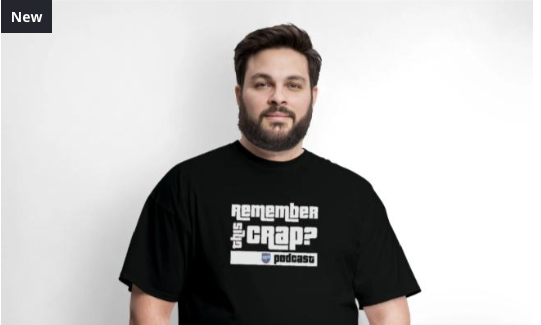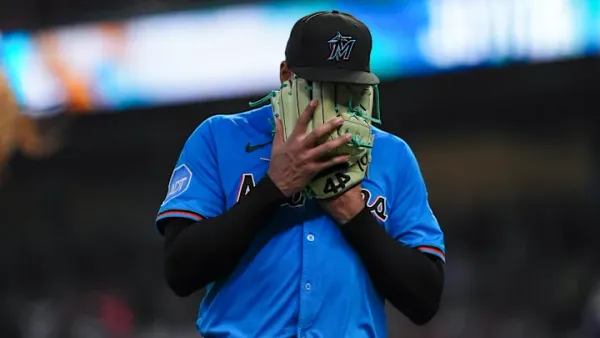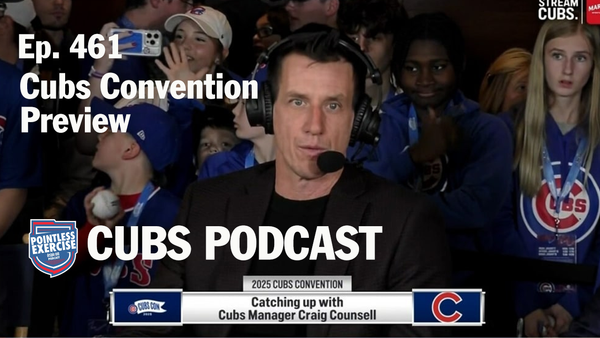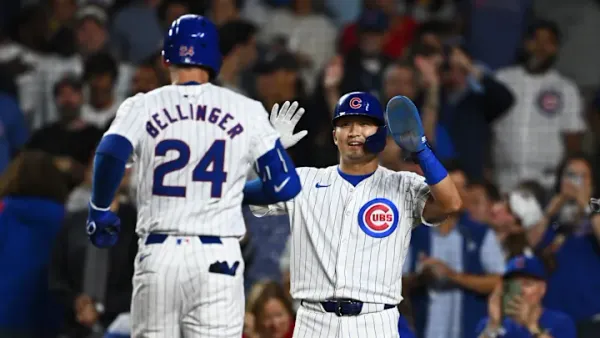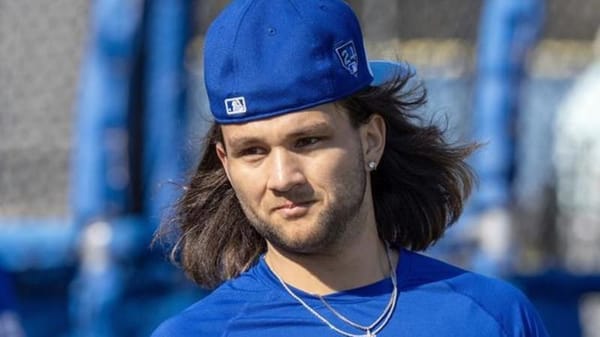The Dodgers aren't the ones ruining baseball
You already know who is.


In the heady afterglow of winning another National League pennant, Dodgers manager Dave Roberts had something to say to the critics of the Dodgers' ongoing plan to pay money to hire the best possible baseball players.
Like most of his managerial moves, Dave was wrong. The Dodgers aren't ruining baseball. They may have the biggest payroll, and seemingly add the best players every offseason, which tilts the championship odds in their favor. But that's not what threatens the sport that we love.
The Dodgers are owned by a bunch of rich people, and they choose to continue to invest vast sums of money to try to win and win and win.
What makes them different than the owners of baseball's 29 other teams (OK, 28, since Mets' owner Steve Cohen does the same thing--just not as well) isn't the ability to spend hundreds and hundreds of millions of dollars on their payroll.
It's the desire to do it.
The Dodgers have the highest total payroll in the sport at $350 million. The teams they beat in the NL playoffs had payrolls of $119 million (the Reds, which ranks 23rd), $290 million (Phillies, fourth) and $121 million (Brewers, 22nd). They are in the World Series against the Blue Jays who have a payroll of $255 million, which ranks fifth.
The Blue Jays are not a small market team. Toronto is the fourth largest city in Major League Baseball and the largest market to have just one team, and with Bud Selig and Jeffrey Loria fucking over the Expos 20 years ago, the Jays have an entire country to themselves.
The payroll mismatches of the Dodgers versus the Reds and Brewers has some media and fans screaming for a salary cap for baseball. But a cap is completely unnecessary. Consider that the Brewers are owned by Mark Attanasio who has a net worth of $1.9 billion, and he saves a lot of money by stealing sand, and the Brewers didn't have to pay a dime for the ballpark they play in.
The Reds are owned by Bob Castellini and run by his son, Phil. You might remember Phil. He did an on-field interview before the 2022 season with the fans booing him, and when asked about whether he felt the Reds owed the fans a better roster he said, "Where else are they gonna go?" Fun guy.
The Castellinis are baseball's poorest owners. Their net worth is estimated at around a half billion dollars. Consider they bought the team in 2006 for $270 million and it's now worth $1.1 billion. There are no poors among baseball's ownership.
The most frustrating ownership might be the White Sox, who are chronically mismanaged by Jerry Reinsdorf, but that's fun for Cubs' fans. So instead it has to be the Pissburgh Pirates. They have baseball's best pitcher in Paul Skenes on a dirt cheap (even as a number one overall draft pick) contract, and they do nothing to try to build a competitive roster around him. They are already resigned to losing him in free agency after the 2029 season, but show no urgency to try to build a winner while he's still around. They are owned by the Nutting family, who can apparently only afford an $84 million payroll (27th in baseball) despite a net worth of $1.3 billion.
But the worst offenders are the ones who bring in huge amounts of revenue, but don't spend enough to seriously contend for a championship.
A lot was made this past offseason of a chart that showed teams' revenues and payroll. The payroll is easy to calculate, but revenue is more squishy. This chart used data from Forbes, which isn't always accurate, but when it's not accurate it tends to be on the low side.
The chart did not reflect well on the ownership of Chicago's north side nine.
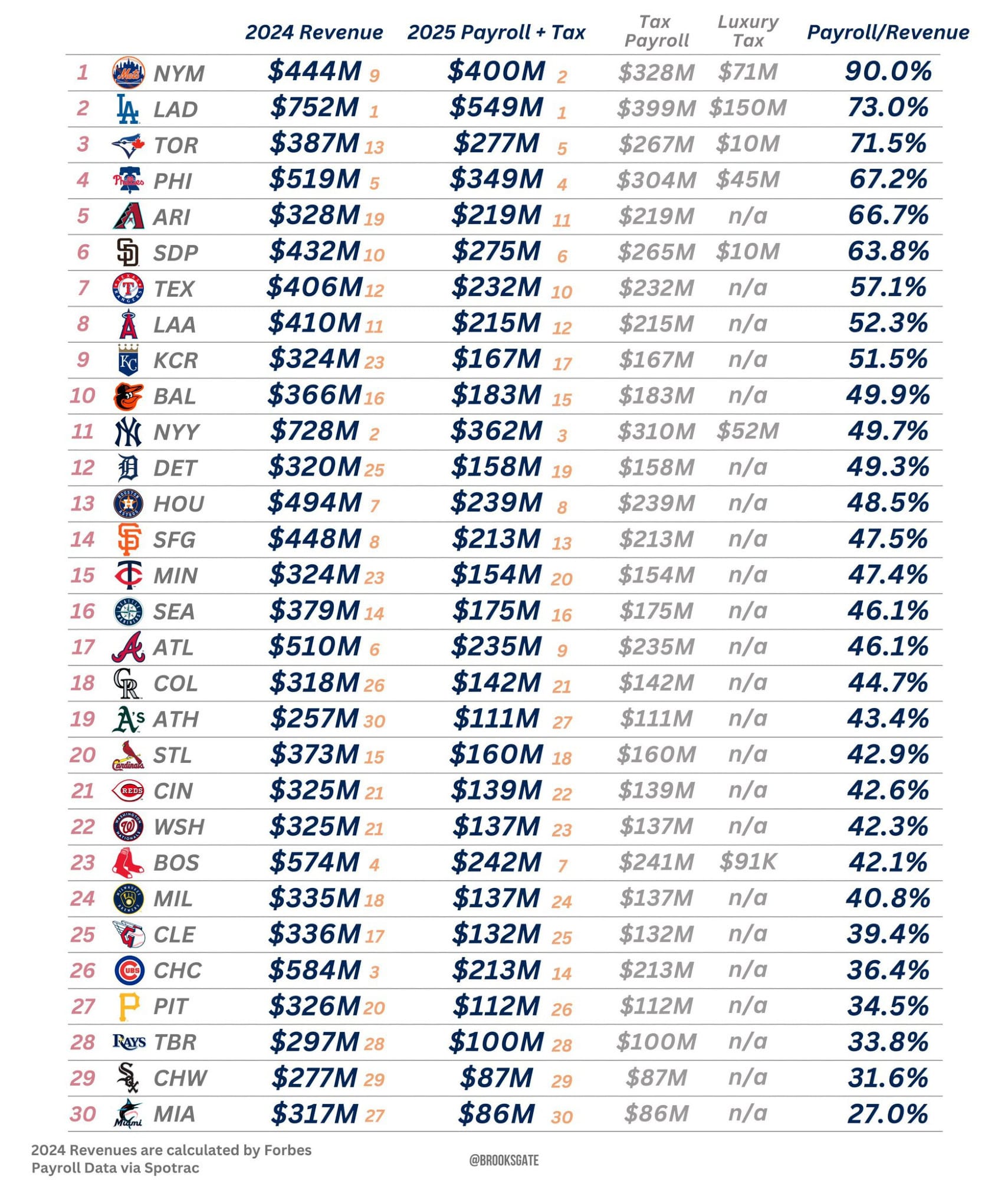
Third in revenue at $584 million, and 14th in payroll at $213 million.
How many times have we heard Tom Ricketts insist that "every dollar we earn is put back into the team." He says it in every interview he does when he's pressed on the team's spending. He also claims that all they want to do is "break even."
Well, it looks like you're doing more than breaking even, Tom.
But that's not even the issue to me.
I don't care what the Cubs' payroll is. I care what their record is. If they can build a 100 win team with a low payroll, more power to them. But if they can't (and they can't) then their payroll is not high enough, because they do not have enough good players. It's that simple.
The Cubs don't seem to remember how they actually won the World Series in 2016.
They won it with the third-highest payroll in the game at $186 million. That was despite having some of their best players on their rookie contracts, like Kris Bryant, Javy Baez, Addison Russell, Kyle Schwarber, Kyle Hendricks, etc. But they knew they needed to pay to get top players to round out their roster like Jon Lester, Ben Zobrist, Dexter Fowler, Jason Heyward (well, he was paid like a top player, at least), etc.
That their payroll has only increased by about 30 million bucks over nearly a decade is telling. Their annual revenues have certainly not only increased by 30 million bucks. The 2016 Dodgers led baseball with a $266 million payroll, and nine years later it's about $100 million higher in actual payroll, and $250 million in payroll and tax.
Would the Cubs be more competitive if they had kept pace with the Dodgers? Yes, of course they would be. And would they be able to afford that kind of spending, or would Todd Ricketts have to go sell his blood plasma every month to make ends meet? Yes, and just on the revenues of the team. But if they did have to supplement it, they probably have a few bucks lying around. Joe Ricketts, the father of the fail sons (and Laura) who run the team, sold the family business, TD Ameritrade a few years ago for $26 billion dollars.
Even if the Cubs ran the team at a loss, the sheer tonnage of their wealth would shield them from ever feeling it. Take it from Charles Foster Kane.
If the Cubs ran at a loss of, well let's pick a nice, big fat round number for example, $100 million a year. The Garbage Family™ would be forced to sell (for a substantial profit) in 260 years.
Fine, that $26 billion isn't liquid, but you get the idea. Any big league team could operate at a loss for a very long time. And we don't even expect them to operate at a loss every year.
But take this year for example. The Cubs clearly thought they had built to something. And Jed Hoyer made an aggressive trade to add a truly great hitter to the lineup. And it failed. The Cubs will tell you that it failed because Kyle Tucker broke his finger, then strained his calf. But the real reason it failed is that they didn't do anything else. Tucker was in the final year of his contract and made $16.5 million. It increased the payroll by less than $10 million because Isaac Paredes went the other way in the deal and made $6.65 million for the Astros.
It was a calculated half measure. The Cubs made no attempt to try to convince Tucker to extend his contract, and nobody expects them to make him a serious offer this offseason.
One team who will? The Dodgers. Of course they will. You know why? Because they have built the core of their team around great players who other teams let get away. The Red Sox traded them Mookie Betts. The Barves let them sign Freddie Freeman who really wanted to stay, but Atlanta went out and traded for Matt Olson to replace him while Freddie was still a free agent. The Angels botched their seven years of Shohei Ohtani. And on, and on, and on. Tucker to the Dodgers will fit the same mold. The Astros were afraid to try to re-sign him so they traded him to get something for him. The Cubs can't be bothered.
So who is ruining baseball? The Dodgers, who pay top dollar for top players, and who pay every penalty that MLB imposes, both financial and in draft picks and international pool money limitations? Or the Cubs, who seem content to replace a four-time All-Star and Gold Glove outfielder with Owen Caissie, who has struck out 277 times in 226 games at triple-A?
The Cubs operate under the fantasy that once the playoffs start every team has the same chance to win the championship. Their dream scenario is to build a team like the 2023 D'bags, who only spent $119 million and only won 83 games, but who won the pennant.
That ignores the fact that they lived the reality of the playoffs this year. The Cubs, even with the acquisition of Tucker in the winter, came to spring training knowing they were at least one bat short in their lineup, and they knew they didn't have enough starting pitching. Both of those things were true at the trade deadline in July--in fact, the starting pitching need was even greater--and they ignored it.
And both of those things killed their chances of advancing past the divisional round of the playoffs. What happened to "anything can happen" in the playoffs? The reality is that anything can happen, but the obvious thing happens most of the time.
There is no guarantee that a bigger payroll would make them a better team. But there is a guarantee that refusing to spend to fix obvious weaknesses dooms them to a roster with a ceiling that isn't high enough to win anything.
One big problem with the Cubs is their undeniable track record of shopping at the middle of the free agent market. They have a very defined type. Outside of team friendly deals for Japanese players Seiya Suzuki (a very good signing) and Shōta Imanaga (another good signing that they appear to be ready to screw up this winter), Jed mostly signs mediocre white guys to relatively short deals.
His one exception was the signing of mediocre white guy shortstop Dansby Swanson to a seven-year, $177 million contract. But even that kind of fit their model. There were four top shortstops on the market that year and Dansby signed for the least amount of money.
Otherwise it's a lot of Jameson Taillon (four years, $68 million), Matt Boyd (two years, $29 million), Ian Happ (three years, $60 million), Nico Hoerner (three years, $35 million), Carson Kelly (two years, $11.5 million), etc.
These kinds of deals would be fine (well, not Happ's) if they were supplemented with a big, aggressive deal every couple of years, hell, every four years would be an improvement. You win with stars. Trading for Tucker was an acknowledgement of that, but it also came with a very comfortable one year risk attached to it.
This is the kind of shit that's ruining baseball. Big market, big money teams, who refuse to compete with the Dodgers where it really matters, in player acquisition.
And don't buy the nonsense that the luxury tax has crippling penalties that must be avoided at all costs. The Cubs crept over that threshold in 2024 on accident, and acted like it was a horrible catastrophe. So much that they wouldn't dare go over it again in 2025.
Meanwhile, the Dodgers have been over the luxury tax nearly every year of its existence. And the penalties have decimated them so completely that they have made the playoffs every year since 2013. They have won five pennants and two World Series, so far. And they have one of the top farm systems in the majors year over year. In fact, they had such a surplus of corner infielders a couple of years ago that they had Michael Busch to spare.
There will be a lot of salary cap talk as the owners and players prepare for another round of labor negotiations after next season.
It's not needed. Rich teams can still sit on their asses trying to maximize profits in a salary capped league, too. Hell, just look at the Bulls.
The Ricketts think that a cap will reign in the Dodgers and they can compete with them without having to spend at the level it currently demands. But it will also take their advantage away over the Brewers, Reds, Pirates and Cardinals. You could say that it's probably just as well, considering that they seem to have no idea what to do with it anyway.
But a salary cap without true revenue sharing like there is in the NFL doesn't level the competitive field for teams, it just limits player salaries. It's an excuse for owners who don't want to spend to hide behind, it's not some great way to make everyone's championship odds equal.
The Dodgers win because they're more willing to spend and they're smarter than teams like the Cubs.
Apparently, nothing's going to change that.

